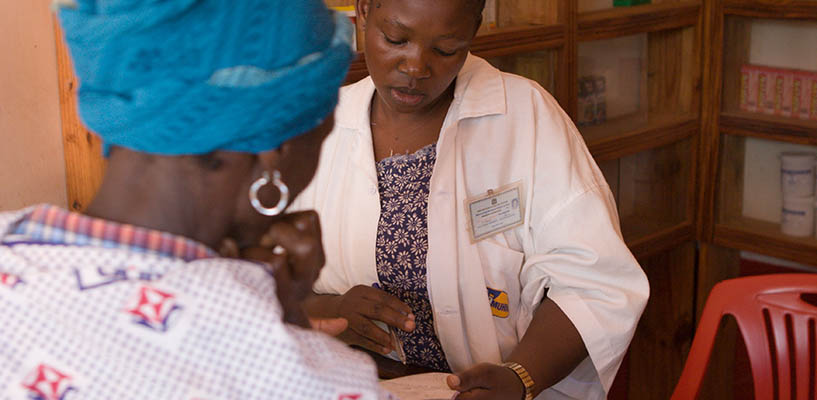Working Together to Fight TB and Drug Resistance
Working Together to Fight TB and Drug Resistance
By Niranjan Konduri

Antimicrobial resistance (AMR) is a global health crisis. In his AMR review, renowned economist Jim O’Neill estimates a loss of US$100 trillion in global productivity by the year 2050 if swift, comprehensive action to fight AMR is not taken. The publication acknowledges multi-drug resistant tuberculosis (MDR-TB) as a “cornerstone of the global AMR challenge.”
In low- and middle-income countries, the thriving private sector pharmacies, also known as medicine shops, are often a convenient and affordable place for people to seek advice on various health ailments, including symptoms that may indicate TB. For nearly a decade, the World Health Organization, the Stop TB partnership, the International Pharmaceutical Federation and other stakeholders have pressed for a greater role of private pharmacies in referring persons suspected of having TB to the nearest designated health facility, where they can be appropriately diagnosed and treated.
My research paper investigated whether such a strategy is actually working in countries with a strong private sector and a high burden of tuberculosis. Here are two key takeaways:
- Although private pharmacies are willing and able to contribute to TB control efforts, interventions have not scaled up as much as they should. Their coverage ranged from less than 5% to 9% of the universe of private pharmacies, which is unlikely to make a significant public health impact. (See figure 1 in paper.)
- Government authorities that regulate medicines, national pharmacy associations, private pharmacy and wholesaler associations and pharmaceutical companies need to step up in the collective fight against both TB and AMR. (See figure 2 in paper.)
Many global pharmaceutical companies have a presence in various emerging markets with a generally high burden of disease. The influential Access to Medicines Foundation has plans to track pharmaceutical company progress in AMR. As figure 2 of my paper illustrates, manufacturers have a role to play in aligning incentives with a shared vision among private pharmaceutical sector entities to prevent irrational antimicrobial dispensing.
For example, I cited the Lilly Global Health Partnership’s Creating Champions of Change as an example of a successful public-private partnership that reached more than 75,000 private pharmacies and harnessed various private sector entities in four states of India with a high burden of TB.
Pharmaceutical companies can build on their existing working relationships with private retailer and wholesaler associations and national pharmacy associations. They can boost the important role of private-sector pharmacies by promoting adherence to local laws, advocating for appropriate antimicrobial use, reaffirming the dispensing of antimicrobials only with a prescription and supporting educational initiatives on MDR-TB and AMR.
To learn more, read my open-access research paper, “Engagement of the private pharmaceutical sector for TB control: rhetoric or reality?”, by visiting the Journal of Pharmaceutical Policy and Practice website.
Research was funded by the US Agency for International Development’s Systems for Improved Access to Pharmaceuticals and Services Program.